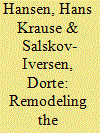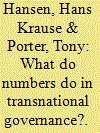|
|
|
Sort Order |
|
|
|
Items / Page
|
|
|
|
|
|
|
| Srl | Item |
| 1 |
ID:
064816


|
|
|
|
|
| Publication |
Apr-Jun 2005.
|
|
|
|
|
|
|
|
|
|
|
|
|
|
|
|
| 2 |
ID:
151673


|
|
|
|
|
| Summary/Abstract |
Two paradoxes associated with big data are relevant to global governance. First, while promising to increase the capacities of humans in governance, big data also involve an increasingly independent role for algorithms, technical artifacts, the Internet of things, and other objects, which can reduce the control of human actors. Second, big data involve new boundary transgressions as data are brought together from multiple sources while also creating new boundary conflicts as powerful actors seek to gain advantage by controlling big data and excluding competitors. These changes are not just about new data sources for global decision-makers, but instead signal more profound changes in the character of global governance.
|
|
|
|
|
|
|
|
|
|
|
|
|
|
|
|
| 3 |
ID:
130913


|
|
|
|
|
| Publication |
2012.
|
| Summary/Abstract |
This study examines how numbers in transnational governance constitute actors, objects, and relationships, including relationships of power. We review the existing literatures on numbers for insights relevant to their role in transnational governance, including the ontology of numbers, the history of numbers and their role in governance. On this basis, we set out the main distinctive ways that numbers are implicated in transnational governance. We conclude that studies of transnational governance would benefit from paying more attention to the much overlooked performative role of numbers in governance processes. Numbers have properties that differ from words, and shifts from one to the other in governance, for instance in the displacement of laws or norms with risk models or rankings based on numbers, have particular effects, including political effects on states, firms, individuals, and other actors and institutions.
|
|
|
|
|
|
|
|
|
|
|
|
|
|
|
|
|
|
|
|
|